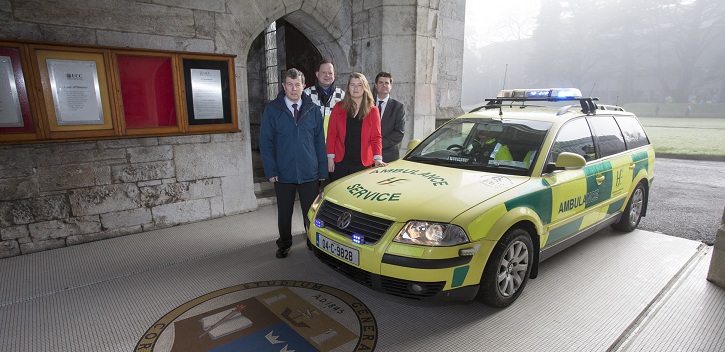2014 Press Releases
UCC leads research to reduce impact of catastrophes

Given the recent storms in Cork it is fitting that UCC will lead an EU research project worth €3.5m to develop a new standard in crisis management.
Large-scale disasters, whether natural or manmade, require immediate response under time pressure, rapid decision-making (most often with lack of complete data), appropriate allocation of resources (sometimes quite scarce), prioritising casualties and casualty evacuation, administering first-aid, dealing with human and psychological stress, and efforts to limit the level of devastation. All of this becomes more complicated in the case of cross-border catastrophes.
Current solutions, however, do not fully address all of the challenges. To overcome present shortcomings, the partners of the new consortium, S-HELP (Securing Health Emergency Learning and Planning), will develop a range of decision support tools and systems for the management of all four phases of an emergency situation: planning, preparedness, response and recovery. Training and crisis-management communication will also be included. The system will ensure flexibility and minimise information overload to improve the quality of information available in a disaster. In addition, an integrated tool-kit will be developed making it possible to judge quickly the size of the emergency and help decision-makers manage incidents involving large numbers of people across different borders.
Having well-trained, competent and motivated people on the ground in an emergency is vital to dealing with it effectively. The reality, however, tends to be that there is limited on-going training and a lack of standardised procedures. This reduces the effectiveness of an international response to emergencies and results in people on the ground being ill-prepared in situations that require split-second decision making in the middle of the chaos and fury of an emergency.
Regular and consistent training coupled with joint exercises are key to good emergency planning. The use of real-world emergency scenarios is the best way to train people who may be involved in responding to an emergency. In the S-HELP project such scenarios will be devised and carried out by the Irish Health Service Executive and Northern Ireland’s Public Health Agency, as well as Magen David Adom, Israel’s national aid society and blood bank service. The scenarios will identify problems in current emergency plans and see how the S-HELP solution will address them.
The international consortium - coordinated by Dr Karen M Neville, Principal Investigator and Managing Director of the Centre for Security Management Research (CSMR), Business Information Systems at the University College Cork is funded by the EU’s Seventh Framework Programme for a period of three years.
The S-HELP team also consists of three small and medium-sized companies (SMEs): accelopment AG, Future Analytics Consulting and Vector Command Limited and four academic institutions/centres: Lund University, Sweden, ASSERT Centre, UCC, TUGraz, Austria, University of Vienna, Austria with complementary and world-leading expertise in security, learning, decision-making and emergency management. This expertise will make a difference.
S-HELP is completely in line with the key regulation in the field of emergency medicine from the European Committee of Standardisation and will set new standards in crisis management – before, during and after an emergency. As such, it will be the leading example of protecting people’s lives through effective emergency learning and planning.
No one can predict when a large-scale disaster will strike, but strike they will. That being the case, there is great comfort in knowing that a project like S-HELP is on hand to break through and improve the emergency response, care, and aftermath treatment of what nature (or man) has in store.
